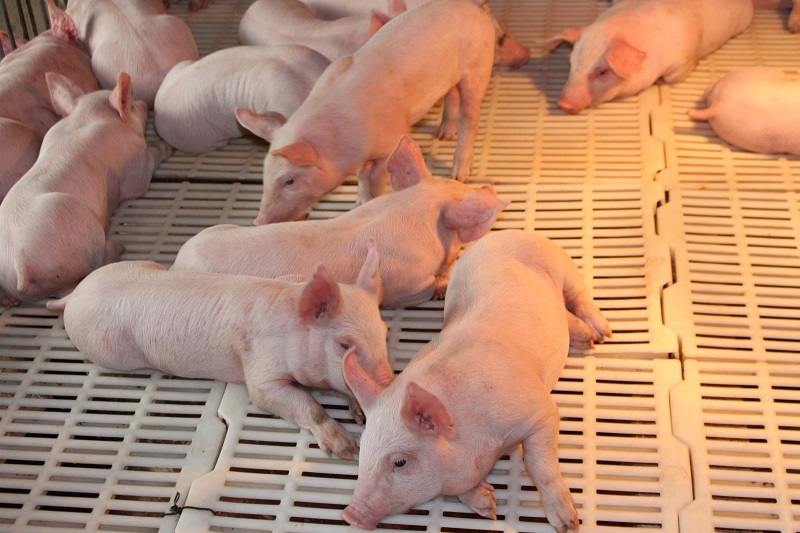New swing towards strict biosafety breed methods
 |
| New swing towards strict biosafety breed methods (illustration photo) |
The continuing threat of African swine fever (ASF) is putting pressure on livestock farmers and consumers alike, with a lack of pork at the markets and desperate efforts to re-populate herds. Especially, the continuously rising price of Vietnam’s favourite type of meat over the last few months, caused by the recent epidemic, is putting pressure on businesses and consumers alike, while simultaneously pushing higher the consumer price index (CPI) for 2019.According to expert projections, ASF will continue to affect the price of pork and the CPI well into the early months of 2020.
According to a representative of the United Nations’ Food and Agriculture Organization, the most important solutions to prevent ASF in Vietnam was to prevent farms from infection via biosafety and disinfection. There are no vaccines for this disease yet, so the key is prevention, not treatment.
With the increase of the diseases like African swine fever, biosafety is now a priority in controlling the expansion of epidemics and improving breeding efficiency, with the added benefit of massive savings on veterinary expenses. Awareness of the importance of biosafety is increasing year by year. As per statistics published by the Ministry of Agriculture and Rural Development, in 2016, nearly 2,150 pig breeding farms met the country’s biosafety standards, making up 18.3 per cent of the total farms across the country. The figure increased to over 2,490 farms (24.4 per cent) in 2017 and over 2,500 farms (25.6 per cent) in 2018.
Livestock companies – which hold the majority of live pigs and the lion’s share of breeding in the country – are increasingly setting biosafety a priority during breeding. One such company is Japfa Comfeed Vietnam Ltd. Do Hoang Long, development and sales manager of the company, told VIR that one of the compulsory requirements in selecting partners to develop outsourcing pig farms is now biosafety.
Japfa’s farms and outsourcing farms are located in the areas flagged for livestock in the provincial planning, away from residential areas. These facilities have three layers of security, including hard fencing, housing areas for workers, and technical teams. Each layer is installed with a strict sterilisation system. These multiple layers of defense prevent pigs from being exposed to pathogens from both humans and animals. At the peak time of epidemics, no one is allowed to leave Japfa farms without proper sterilisation upon leaving and entering.
As the ASF virus can survive for long periods of time in extreme temperatures, even in dried or cured pork products or carcasses, without the investment and effort to improve biosecurity, farmers’ livelihoods will be at risk since there is currently no effective prevention measure.
“In addition, the group issued strict standards for the wastewater treatment system and we require partners to reserve at least 10 per cent of the farms’ total investment capital for building the system,” Long said.
The company affirms that 100 per cent of the wastewater produced by its outsourcing farms is treated carefully so that chemical and waste levels are low enough to be safely discharged into the local sewage system.
“While re-populating the herds, it is essential to apply and thoroughly monitor biosafety measures. Along with using a general disinfectant solution, many farms in Japfa’s outsourcing system use the gentian violet smoking method, a low-cost but effective solution,” Long said.
According to a livestock expert, companies cannot neglect sterilisation before repopulating their herds because a lapse can lead to another outbreak. Long from Japfa said that thanks to applying thorough biosafety measures, their company has managed to maintain breeding operations even at the peak of the ASF epidemic. In mid-December, the group imported an additional 100 breeding pigs from Taiwan and 300 from Canada to re-populate its herds in 2020.
What the stars mean:
★ Poor ★ ★ Promising ★★★ Good ★★★★ Very good ★★★★★ Exceptional
Themes: Digital Transformation
- Dassault Systèmes and Nvidia to build platform powering virtual twins
- Sci-tech sector sees January revenue growth of 23 per cent
- Advanced semiconductor testing and packaging plant to become operational in 2027
- BIM and ISO 19650 seen as key to improving project efficiency
- Viettel starts construction of semiconductor chip production plant
Related Contents
Latest News
More News
- State corporations poised to drive 2026 growth (February 03, 2026 | 13:58)
- Why high-tech talent will define Vietnam’s growth (February 02, 2026 | 10:47)
- FMCG resilience amid varying storms (February 02, 2026 | 10:00)
- Customs reforms strengthen business confidence, support trade growth (February 01, 2026 | 08:20)
- Vietnam and US to launch sixth trade negotiation round (January 30, 2026 | 15:19)
- Digital publishing emerges as key growth driver in Vietnam (January 30, 2026 | 10:59)
- EVN signs key contract for Tri An hydropower expansion (January 30, 2026 | 10:57)
- Vietnam to lead trade growth in ASEAN (January 29, 2026 | 15:08)
- Carlsberg Vietnam delivers Lunar New Year support in central region (January 28, 2026 | 17:19)
- TikTok penalised $35,000 in Vietnam for consumer protection violations (January 28, 2026 | 17:15)

 Tag:
Tag:




















 Mobile Version
Mobile Version